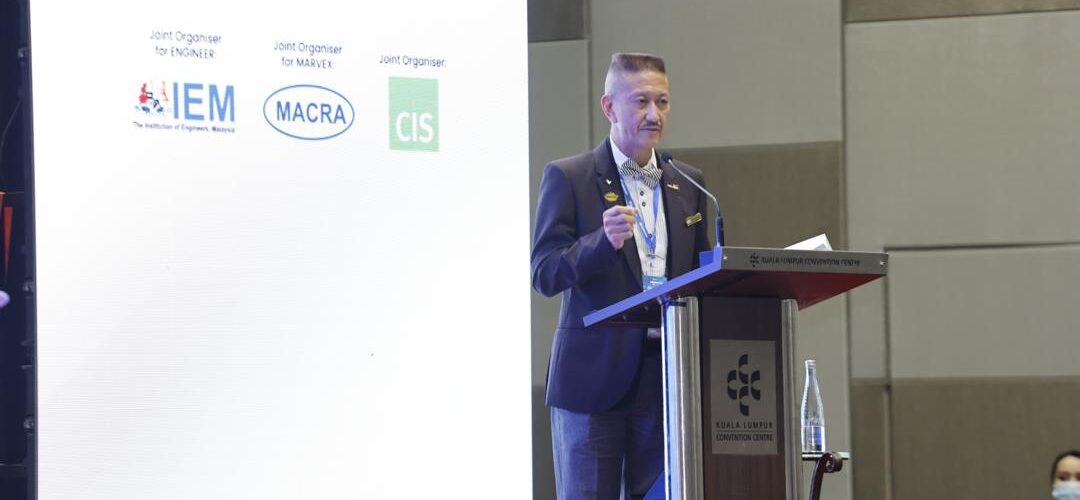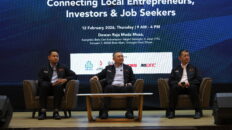By Natasha Isabel Saravanan
Key Takeaways
- Air-Conditioning as Survival, Not Luxury
Tan redefines air-conditioning as essential to human survival, health, and sustainability—especially in a warming world; that HVAC systems are no longer comfort tools but critical infrastructure that ensure safety, air quality, and life continuity in extreme conditions. - Championing Emerging Players and Industry Depth Drawing from his retail background, Tan believes in nurturing “Tier Two” HVAC brands that focus on specialisation and innovation. Supporting these rising players strengthens the industry’s ecosystem and keeps established brands accountable through healthy competition.
- A Vision Beyond Cooling Tan envisions HVAC systems evolving into “human-curated atmospheric solutions” that go beyond temperature control. He foresees innovations like solar-powered cooling, water harvesting, and self-cleaning systems that redefine air-conditioning as a sustainability enabler and resilience tool for humanity.
- Raising Standards and Skills Tan stresses that innovation must be matched by professionalism. Many technicians remain uncertified despite available frameworks (CIDB, JPK, DOE); advocating for higher certification standards, plug-and-play technology to reduce unqualified installations, and continuous upskilling to safeguard consumer trust and safety.
- Building Regional Alliances and Future Readiness Under Tan’s leadership, MACRA has transformed into a professional trade body that collaborates across ASEAN, China, Japan, and Korea. His goal is to establish an ASEAN Centre of Excellence to set global HVAC benchmarks—anchoring Malaysia as a regional hub for sustainable, high-standard innovation.
Air-conditioning is often mistaken for a mere convenience—a luxury switch to flick on when the weather gets unbearable. Peter Tan Chin Wah, President of the Malaysian Air-Conditioning and Refrigeration Association (MACRA), sees it differently. To him, air-conditioning is not just about comfort, but about survival, sustainability, and fairness in a warming world.
The Power at Play
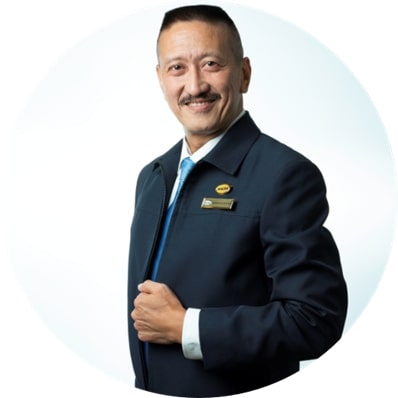
Long before leading an industry association, Tan learnt the value of betting on rising players during his years in the retail management facility industry, where creating the right tenant mix was key to a mall’s success. His example? Giving a global pizza chain, then unheard of in Malaysia, a chance to shine. “They were new players,” he recounted. “I gave them space in a prime spot. They told me they wanted to be number one globally, and I replied, “If I can’t support a number two to become number one, what good am I?”
Peter Tan Chin Wah, President of the Malaysian Air-Conditioning and Refrigeration Association (MACRA), brings an unconventional background in law and consultancy to the HVAC sector.
That lesson in nurturing dark horses continues to guide Tan’s leadership in MACRA. He emphasised the need to support emerging brands in the heating, ventilation, air-conditioning, and refrigeration (HVAC) sector, especially what he mentioned as “Tier Two” players from China and beyond. “12 or 15 years ago if I said I would support Chinese brands, people would laugh,” he reflected. “Today, those same companies have proven themselves by delivering some of the best solutions and products in the industry.”
For Tan, competition from “Tier Two” players is not a threat but an opportunity to highlight what makes the HVAC industry unique: specialisation. Unlike electronic giants that diversify into fridges or televisions, most true HVAC companies focus solely on air-conditioning and refrigeration, ensuring consistent investment in R&D.
He pointed to Willis Haviland Carrier, whose invention of modern air-conditioning in 1902 solved a humidity problem in a Brooklyn printing plant and eventually transformed global architecture and lifestyles. That same spirit of specialisation continues today, with emerging HVAC brands delivering dedicated solutions that push established players to innovate further. For Tan, supporting these companies is about strengthening the industry’s depth and keeping its pioneers accountable.
From Law Graduate to Industry Voice
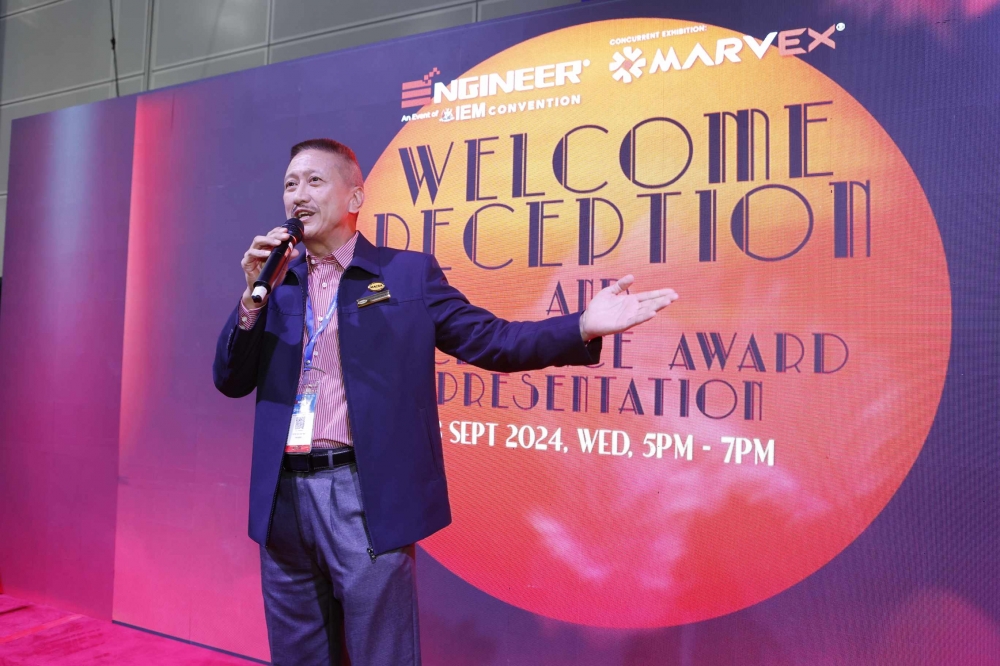
Tan’s route into the HVAC sector was anything but conventional. “I graduated in law, but I’ve always been a consultant,” he explained. “A consultant must immerse themselves fully. Over time, it becomes a part of you.”
When Tan entered the industry, he brought with him the fresh perspective of an outsider—one who saw air-conditioning not just as an electrical equipment for cool air, but as a system designed to condition the very air around us. The term itself, he noted, is about more than temperature: it encompasses cleanliness, humidity, and comfort.
By reframing this understanding, Tan has helped the industry see beyond hardware and electricity, towards the broader role of HVAC in shaping healthier and more sustainable environments. This vision connects directly to his ideas about innovation and survival in an unpredictable future.
Air-Con Beyond Cooling: A Human-Curated Atmosphere
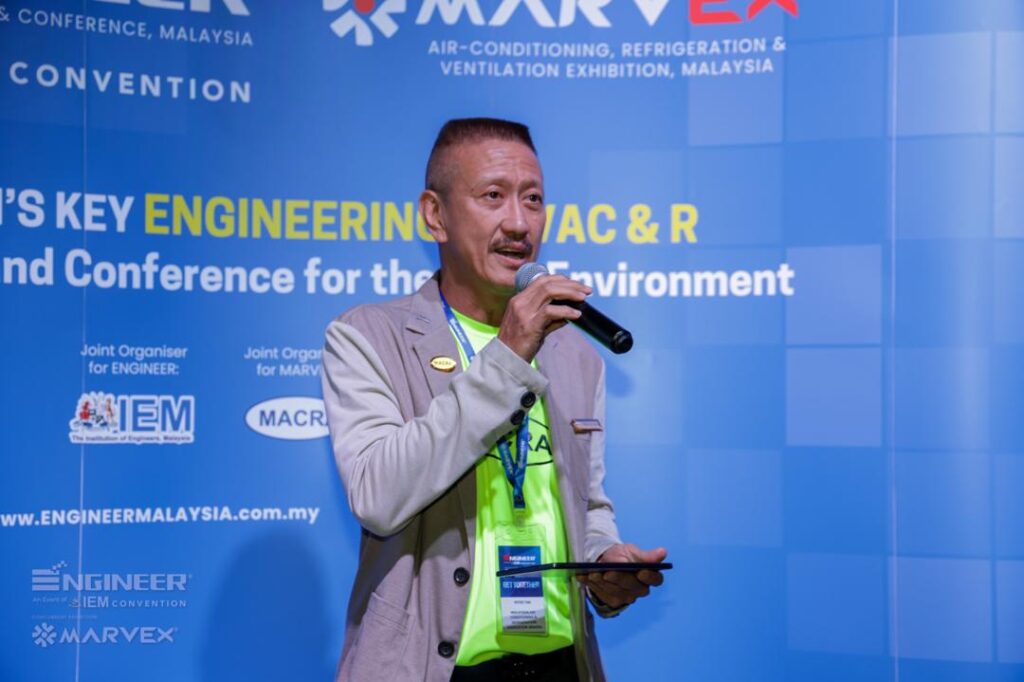
At one point in the interview, Tan leaned forward with a story that sounded almost like science fiction. “Imagine a situation where there is radiation in the air. You are trapped indoors. How do you survive?” he asked. His answer lay not in fear but in innovation: filtration systems, humidity control, and air-conditioning units reimagined as holistic survival tools.
“I call it a human-curated atmospheric solution,” he explained further, coining his own phrase.
To Tan, the future of air-conditioning lies beyond cold air. It encompasses water harvesting, self-cleaning technology, solar-powered systems, and even indoor agriculture. He noted that even technology companies outside the traditional HVAC space have recognised the sector’s potential. “Because it’s not just cooling anymore—it’s about shaping human environments.”
He also highlighted that new technologies could bring added value in regions facing resource challenges. For Tan, the industry must position itself not only as an economic contributor but also as a sustainability partner.
Standards, Skills, and the Battle Against Shortcuts
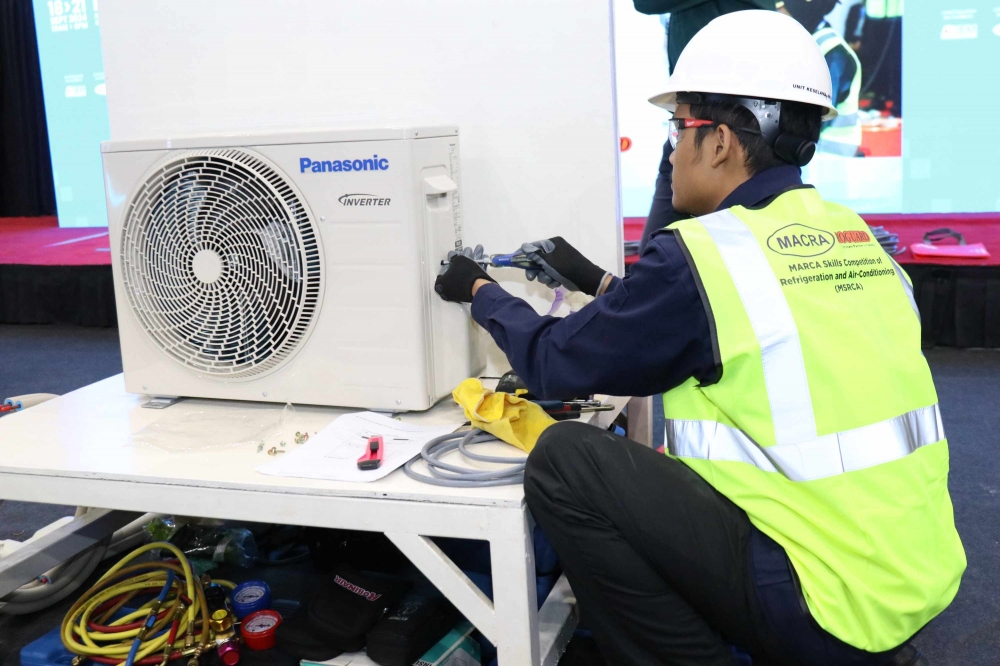
But innovation is meaningless without standards. Tan admitted frustration at the lack of certified technicians in the field. “Many are without certification,” he stated bluntly. He noted that poorly skilled labour often leads to improper installation, leaving users to suffer the consequences.
Tan explained that Malaysia already requires technicians to be certified—through bodies such as the Construction Industry Development Board (CIDB), the Department of Skills Development (JPK), and the Department of Environment (DOE)—yet many in the industry still bypass these requirements. He highlighted that such practices undermine consumer trust and endanger safety.
Tan shared that he sees in the near future a “plug-and-play” air-conditioner—like the old window units—that reduces dependency on unqualified installers.
“If you don’t improve, consumers will demand it,” he cautioned, pointing to how ride-hailing apps disrupted taxi services. “A tsunami of change will come.” For Tan, raising professional standards is not about enforcement but progress.
From Pandemic Lessons to Global Partnerships
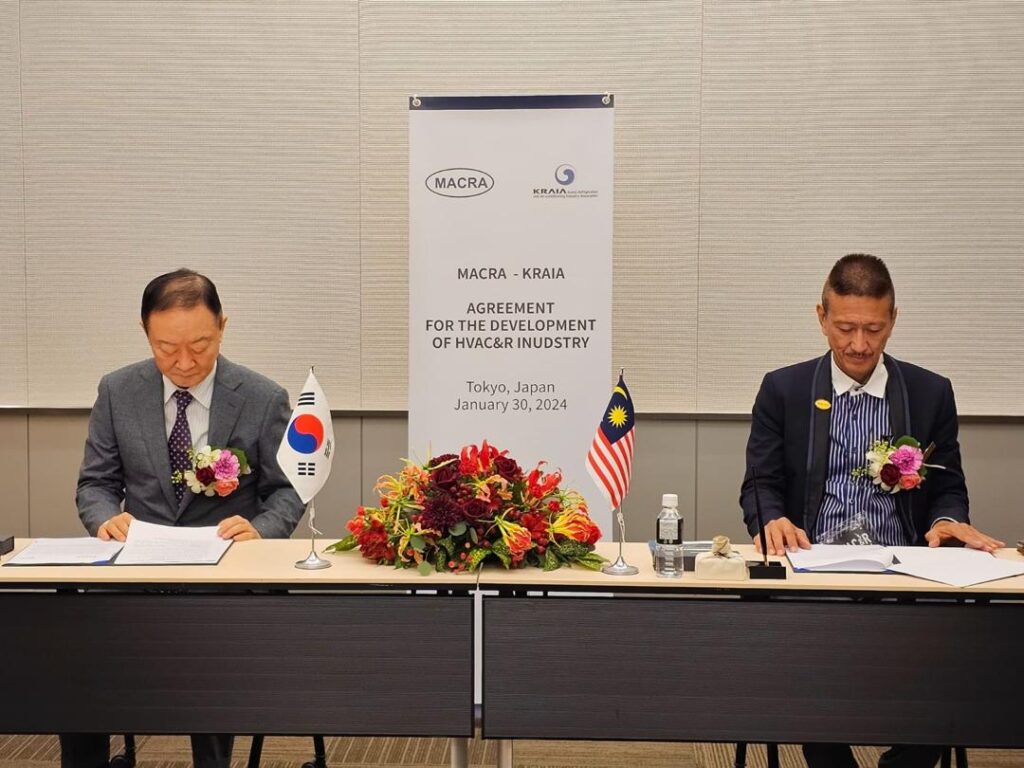
Tan believes that an industry cannot thrive on skills alone, nor on partnerships in isolation—it is the interplay of both that creates resilience. Trained professionals keep standards high on the ground, while alliance with regional and international associations spark innovation and open doors to new markets. By weaving these two strands together, Malaysia’s HVAC sector can move from simply adopting technologies to actively shaping them.
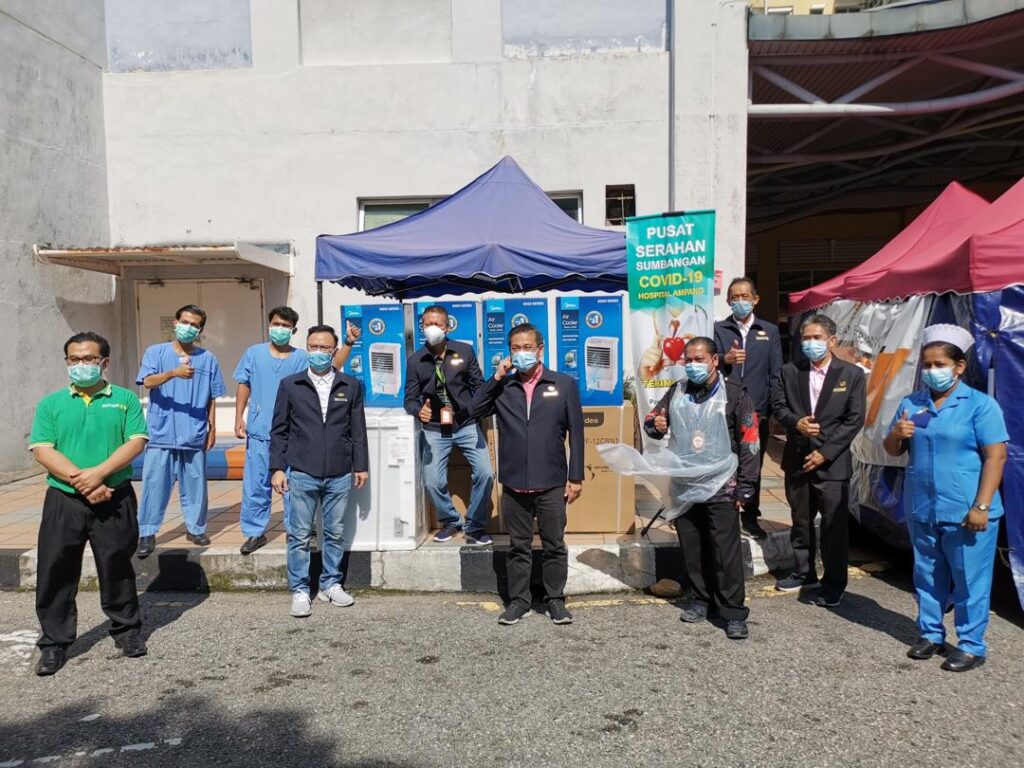
When COVID-19 struck, MACRA became an unsung frontline partner. “KKM called us,” Tan recalled, referring to the Ministry of Health. “They needed cooling systems for makeshift wards and mortuaries. We delivered, even during lockdown.”
Those experiences underscored HVAC’s role not just in comfort but in survival. Operating theatres, pharmaceutical labs, and even emergency morgues depend on controlled air systems.
“Air-conditioning is no longer a luxury,” Tan stressed. “It’s a human rights issue. Access to air-conditioning means access to life.”
This conviction shapes his vision for MACRA’S future. Under his presidency, the association has signed MOU’S with ASEAN counterparts, China, Japan, and Korea, strengthening Malaysia’s role as a regional hub. His ultimate goal: establishing a Centre of Excellence in ASEAN to set global standards, test innovations, and represent the region’s manufacturers.
Cooling the Future, Together
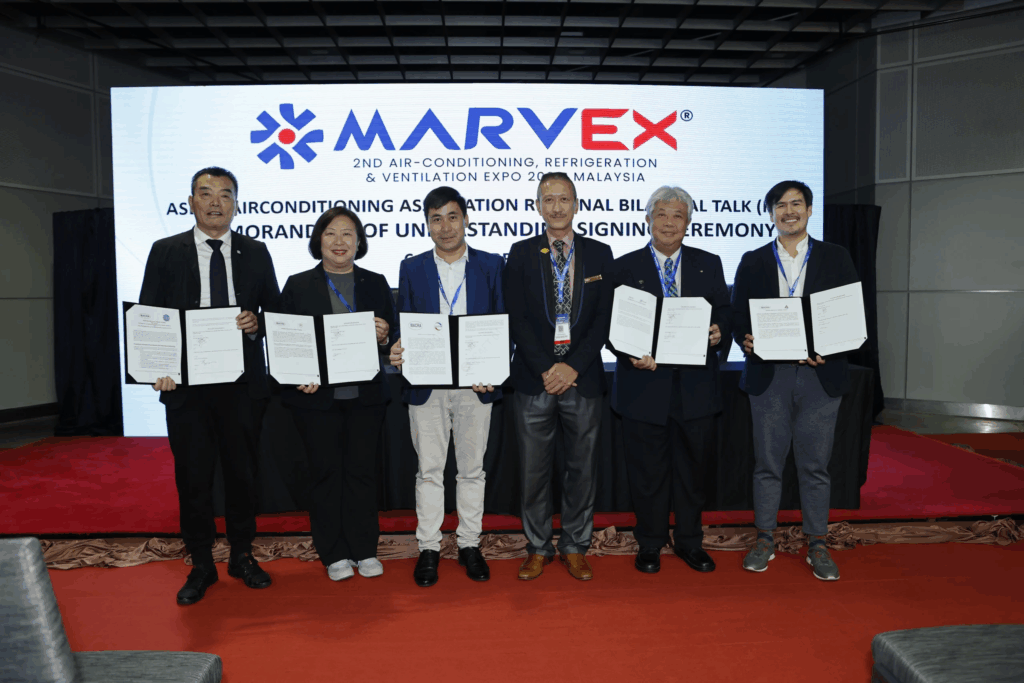
From nurturing underdog players to redefining what air-conditioning truly means, Tan has framed HVAC not as a convenience, but as a cornerstone of modern survival. His vision for MACRA stretches far beyond cooling systems: it champions innovation, demands higher professional standards, and calls for global partnerships that place Malaysia at the heart of regional excellence.
That journey began with pragmatism. “I often say, if you have money, you can do things in a certain way. If you don’t, you must find a different way. That’s the ‘got money style’ and the ‘no money style,’” Tan recalled with a laugh. This mindset helped transform MACRA from a perceived social club into a professional trade association, now recognised as both a learned society and an industry leader.
For Tan, the role of HVAC extends beyond technology—it shapes the very spaces we inhabit. Drawing on Winston Churchill’s words, “We shape buildings, thereafter they shape us,” he reminds us that the industry moulds how people live, work, and thrive. Extending Churchill’s thought, he adds his own maxim: “HVAC innovates boundless shapes.”
His message lands with force: cooling is no longer a luxury, it is survival. As heatwaves intensify and uncertainties mount, the industry’s future lies in systems that not only cool but clean, harvest, and protect. In this vision, air-conditioning is not just comfort—it is a lifeline and, under MACRA’s leadership, a powerful force for sustainability, fairness, and resilience.



